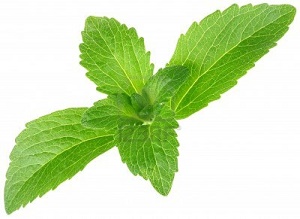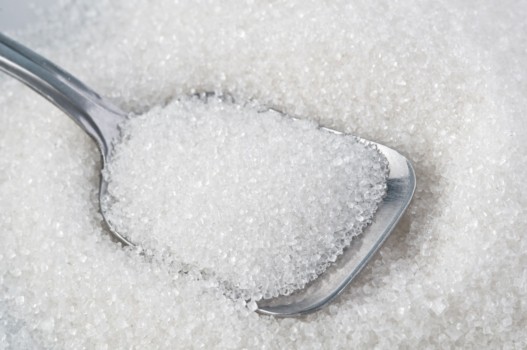by Lauren Cox, Live Science Contributor

Leaves of the stevia plant are used to make a sugar substitute.
Credit: Stevia plant and powder via Shutterstock
Stevia is perhaps unique among food ingredients because it's most valued for what it doesn't do. It doesn't add calories. Unlike other sugar substitutes, stevia is derived from a plant.
The stevia plant is part of the Asteraceae family, related to the daisy and ragweed. Several stevia species called "candyleaf" are native to New Mexico, Arizona and Texas.
But the prized species, Stevia rebaudiana (Bertoni), grows in Paraguay and Brazil, where people have used leaves from the stevia bush to sweeten food for hundreds of years. In traditional medicine in these regions, stevia also served as a treatment for burns, colic, stomach problems and sometimes as a contraceptive.
Today, stevia is part of the sugar substitute market.
The U.S. Department of Agriculture estimates Americans added more sugar to their diet every year since the 1970s until 2000. When Americans dropped the added sugar, they turned to sugarlike extracts. The sugar substitute market was estimated to be worth $10.5 billion in 2012, according an analysis by Markets and Markets research firm.
And the market may be growing. Just 18 percent of U.S. adults used low- or no-calorie sweeteners in 2000. Now, 24 percent of adults and 12 percent of children use the sugar substitutes, according to a 2012 review in the American Journal of Clinical Nutrition. [9 Snack Foods: Healthy or Not?]
Does stevia work?
Stevia has no calories, and it is 200 times sweeter than sugar in the same concentration. Other studies suggest stevia might have extra health benefits.
"Available research is promising for the use of stevia in hypertension," said Catherine Ulbricht, senior pharmacist at Massachusetts General Hospital in Boston and co-founder of Natural Standard Research Collaboration, which reviews evidence on herbs and supplements. Ulbricht said Natural Standard gave stevia a "grade B for efficacy" in lowering blood pressure. Other studies suggest stevia could benefit people with Type 2 diabetes, but Ulbricht says more research is needed.
A no-calorie source of sweetness is an obvious diet solution in theory. But a few studies show that replacing sugar with artificial or low-calorie sweeteners may not ultimately lead to weight loss in real life.
A 2004 study in rats found low-calorie sweeteners led the animals to overeat, possibly because of a mismatch between the perceived sweetness and the expected calories from sugar, according to the paper in the International Journal of Obesity and Related Metabolic Disorders. The author of that study later argued that people who use artificial sweeteners may suffer health problems associated with excess sugar, including metabolic syndrome, which can be a precursor to diabetes.
"A number of studies suggest people who regularly consume ASB [artificially sweetened beverages] are at increased risk compared with those that do not consume ASB," Dr. Susan E. Swithers said in a 2013 opinion letter in the journal Trends in Endocrinology and Metabolism.
Yet there is also evidence that stevia does nothing to change eating habits or hurt metabolism in the short term. A 2010 study in the journal Appetite tested several artificial sweeteners against sugar and each other in 19 lean people and 12 obese people.
The study found people did not overeat after consuming a meal made with stevia instead of sugar. Their blood sugar was lower after a meal made with stevia than after eating a meal with sugar, and eating food with stevia resulted in lower insulin levels than eating either sucrose and aspartame.
Is stevia safe?
The question of whether stevia is safe to consume largely depends on what someone means by "stevia." The U.S. Food and Drug Administration has not approved stevia leaves or "crude stevia extracts" for use as food additives. Studies on stevia in those forms raise concerns about the control of blood sugar and effects on the reproductive, cardiovascular, and renal systems, the FDA warns.
However, the FDA has allowed companies to use an isolated chemical from stevia as food additive, calling the chemical "generally recognized as safe." Now, products such as Truvia and others have the legal go-ahead to use Rebaudioside A, which is also found in stevia, in their no-calorie sweeteners.
But there are some health concerns surrounding the stevia plant. Stevia may cause low blood pressure, which would be of concern to some taking blood pressure medications.
"Caution is advised when using medications that may also lower blood sugar. People taking insulin or drugs for diabetes by mouth should be monitored closely by a qualified health care professional, including a pharmacist," Ulbricht said.
Stevia may also interact with anti-fungals, anti-inflammatories, anti-microbials, anti-cancer drugs, anti-virals, appetite suppressants, calcium channel blockers, cholesterol-lowering drugs, drugs that increase urination, fertility agents and other medications, Ulbricht said. People should talk with their doctor before deciding to take stevia in large amounts, she said.
GenusStevia plants related to daisies, asters and sunflowers

The stevia extract comes from about 150 different species of herbs, in the genusStevia. It's a group of plants related to daisies, asters and sunflowers.
daisies

asters
sunflowers
You need your coffee a little sweet? Sugar or stevia?
Most of the people use white sugar to sweeten their coffee, but is that the best choice?
Stevia
The sugar substitute is extracted from the stevia plant. A species called Stevia rebaudiana is naturally grown in Brazil and Paraguay, where it has been used for hundreds of years to sweeten coffee, food and to treat burns and stomach discomfort.
Stevia Rebaudiana
Stevia can be purchased in liquid and powdered concentrates, even though its calorie-free, the plant extract can taste 200/300 times sweeter than the same amount of granulated table sugar.
Stevia isn’t necessarily all natural when its industrial processed, because many companies include additional ingredients, but for now there are not enough researches to point to stevia's health benefits.
Sugar

White sugar is highly refined and made from cane or beets, its carbohydrate. Brown sugar is nothing more than white sugar that has been mixed with molasses to color it and give it a more moist texture. Sugar is simply separated from the beet or cane plant, and the result is 99.95% pure sucrose (sugar), most of the people have the habit to drink their coffee with it.

sugar cane

beets
A fact you need to know about sugar is that it’s a addictive (opiate-like) substance that activates the brain’s reward system and needs to be consumed in small doses.



Without insulin, cells cannot absorb sugar, which they need to produce energy. Type 2 diabetes formerly called adult-onset or non-insulin-dependent diabetes, this disease can develop at any age. It most commonly becomes apparent during adulthood. Best diabetes treatment
ReplyDelete